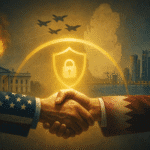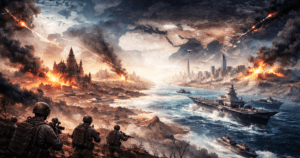A recent flotilla carrying humanitarian supplies to Gaza has reignited global debate over the legitimacy of Israel’s blockade and the international community’s failure to ensure aid access during conflict. The Global Sumud Flotilla, made up of around 40 vessels and 500 activists, aimed to challenge maritime restrictions by delivering essential goods directly by sea. Most ships were intercepted by Israeli forces in international waters. Only one, the Mikeno, reportedly reached Gaza’s coast before communications were lost.
This confrontation is not just about one flotilla. It’s about the legal limits of naval blockades, the politicization of aid, and growing international frustration over the siege of Gaza.
Legal Ambiguity on the High Seas
Israel claims its blockade is a legitimate security measure, but human rights groups and legal scholars argue otherwise. The flotilla was intercepted roughly 70 nautical miles from Gaza, far outside Israeli territorial waters. Under the San Remo Manual, blockades during conflict must be proportionate and allow humanitarian aid to pass when civilians are in need.
Spain’s public prosecutor launched an investigation into whether the seizure of its nationals aboard the flotilla violated international law. The core legal issue remains whether a state engaged in conflict can restrict access to aid so extensively, especially when civilian suffering is well documented.
Symbolic Cargo, Real Crisis
The flotilla’s supplies, 100 kg of flour, 250 kg of rice, baby formula, medical kits, diapers, crutches, were small in scale, yet the mission spotlighted Gaza’s collapsing humanitarian situation. Aid agencies report that convoys entering through land routes are often looted or obstructed.
With over two million people trapped in a conflict zone, Gaza’s population faces severe shortages of water, food, and medical care. The flotilla highlighted how hard it is to get aid in, even when it’s offered.
The interception raised concerns that all independent delivery efforts, even peaceful and civilian-led ones, will be blocked. That leaves humanitarian groups reliant on channels often under military control, where aid is delayed, diverted, or denied.
Global Reaction and Political Fallout
The flotilla’s interception triggered a strong response. Several governments, including Spain, Ireland, Turkey, and Italy, condemned the action and demanded accountability. Italy’s Prime Minister criticized a planned general strike in support of the mission, while activist Greta Thunberg, who was reportedly among those detained, drew attention to Gaza’s dire conditions.
This incident adds pressure on international courts, especially as the International Court of Justice continues to hear complaints related to Israel’s actions in Gaza. Whether or not the flotilla changes policy, it has clearly elevated public scrutiny and legal momentum.
A Final Note: A Test for the Global System
This flotilla was not a supply mission in the traditional sense. It was a direct challenge to a system where the rules of war and the rights of civilians are often blurred. It showed that when governments fail to ensure humanitarian access, civilians and activists may step in, at great risk.
Whether this changes the situation in Gaza is unclear. But it has raised the stakes. Future flotillas may follow. So too may legal battles and diplomatic rifts. At the heart of it all remains a basic question: who gets to control aid, and at what cost?













